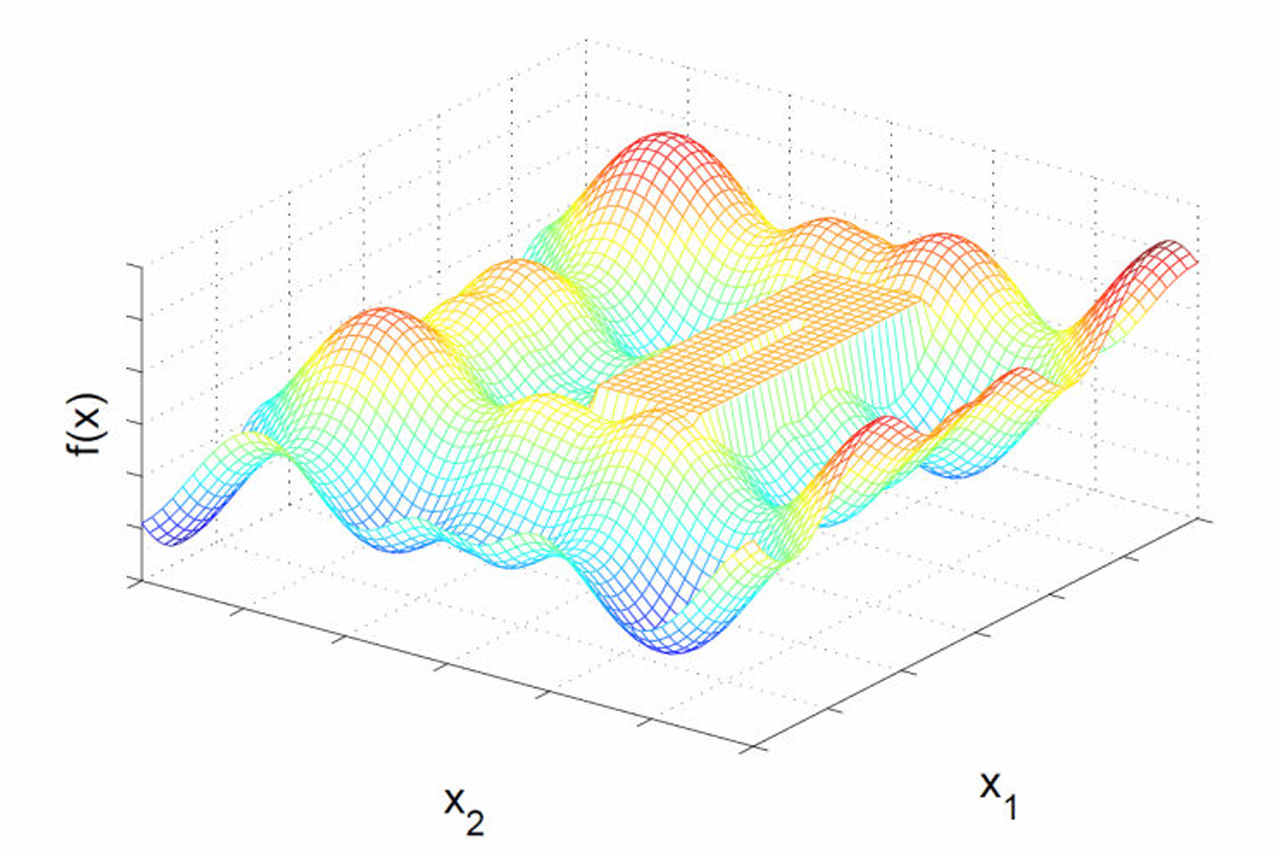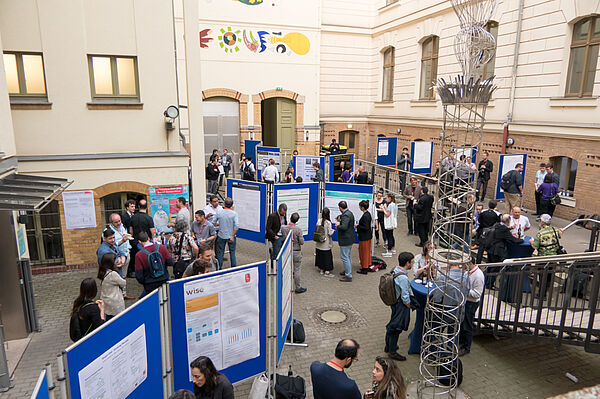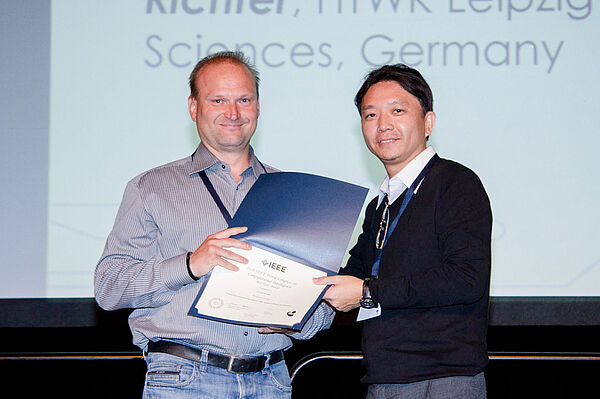Professur Regelungstechnik

Prof. Dr.-Ing. Hendrik Richter
Institut
MSR | Institut für Mess-, Steuerungs- und Regelungstechnik
Forschungsprofil
Robotics, Control & AI
Kontakt
Raum: WI14.1
Telefon: +49 341 3076 1123
E-mail senden | hendrik(dot)richter(at)htwk-leipzig.de
Publikationen ResearchGate | GoogleScholar
Mitglied Konferenzkomitees (PDF)
Werdegang Wikipedia
Lehre
Bachelorstudiengänge
- Regelungstechnik und Simulationstechnik
- Regelungstechnik 2
- Digitale und ereignis-diskrete Regelung
Masterstudiengänge
- Regelungstheorie - Nichtlineare Regelung
- Naturinspirierte Methoden der Computerintelligenz
- Stochastische und modell-prediktive Regelung
Forschung
- Analysewerkzeuge und Regelungsentwurf nichtlinearer Systeme
- Verfahren der Metaheuristik: biologie-inspirierte Problemlösungen, evolutionäre Algorithmen und evolutionäre Spieltheorie
Awards
- EvoMusArt 2018, Parma, Italy: Best paper award nominee. Visual art inspired by the collective feeding behavior of sand-bubbler crabs.
- IEEE WCCI 2016, Vancouver, Canada: Regular best paper award. Analyzing coevolutionary games with dynamic fitness landscapes.
- EvoComplex 2012, Malaga, Spain: Best paper award nominee. Analyzing dynamic fitness landscapes of the targeting problem of chaotic systems.
Funktionen | Mitgliedschaften
- Institutssprecher MSR Institut für Mess-, Steuerungs- und Regelungstechnik (seit 09/2024), Fakultät Ingenieurwissenschaften, HTWK Leipzig
- Mitglied des erweiterten Senats der HTWK Leipzig
- Mitglied des Prüfungsausschusses der Fakultät Ingenieurwissenschaften, HTWK Leipzig
- Mitglied des Fakultätsrats der Fakultät Ingenieurwissenschaften, HTWK Leipzig
Talks & Tutorials
Tutorial | Game dynamics on evolutionary graphs - An introduction
Upcoming: IEEE Congress on Evolutionary Computation 28.06-1.07.2021 Kraków, Poland (VIRTUAL)
The tutorial will give an overview about concepts and research questions as well as addressing recent developments in studying evolutionary games on graphs. Particularly, the concept of game dynamics with changing strategies and interaction networks is addressed.
Tutorial: Game dynamics on evolutionary graphs - An introduction
Alife 2020 Talk
Generating symmetry and symmetry breaking in sand-bubbler patterns (engl.)
We study creating and breaking symmetry in digitally gen-erated artificial-life-based visual art. Therefore, an artificial swarm-based pattern-making system is used as a test bed. The patterns are generated algorithmically by emulating the collective feeding behavior of sand-bubbler crabs. Our fo-cus is on analyzing concepts and templates for incorporating symmetry and broken symmetry into the creation process of bioinspired art. All four types of two-dimensional symmetry defined by isometric maps are used to create images. Apart from treating geometric symmetry, we also consider color as an object of symmetric transformations. Color symmetry is realized as a color permutation consistent with the isometric maps. Therefore, color permutation groups have been de-signed which utilize mappings on a color wheel.
Generating symmetry and symmetry breaking in sand-bubbler patterns (PDF)
Alife 2020 Talk (Youtube-Video)
Sand Bubbler Art (Youtube-Video)
Tutorial | Recent Advances in Fitness Landscapes (engl.)
IEEE World Congress on Computational Intelligence (IEEE WCCI), Beijing, China, 2014
Fitness landscapes are an abstract way for describing the relationship between the genetically possible (genotype), the actually realized (phenotype) and the survival/reproduction success (fitness). In other words, fitness landscapes are about analysing and visualizing the relationships between genotypes, phenotypes and fitness, while these relationships lay at the centre of attempts to mathematically describe evolutionary processes and evolutionary dynamics.
The tutorial will cover the following topics.
- Principles and perspectives of fitness landscapes
- Examples of empirical and computational landscapes
- Topology, measures and problem hardness
- Coevolutionary and dynamic fitness landscapes
- Open questions and research topics
Tutorial Recent Advances in Fitness Landscapes
Recent Advances in Fitness Landscapes (PDF)
Tutorial | Concepts and recent results in coevolutionary games (engl.)
IEEE World Congress on Computational Intelligence (IEEE WCCI), Rio de Janeiro, Brasil, 2018
Studying evolutionary and coevolutionary games can be seen as an attempt to address a long-standing and fundamental problem in Darwinian evolution. How can the two seemingly contradictory observations be reconciled that individuals experience selective pressure which entails competition in order to be successful in survival and reproduction, but at the same time there is wide-spread cooperative and even altruistic behavior between individuals (and also groups of individuals or even species)? In other words, how can we have selection that favors fitter individuals over less fit, while the same individuals regularly cooperate with and support each other, thus ostensibly leveling off differences in fitness?
Tutorial Coevolutionary games
Concepts and recent results in coevolutionary games (PDF)






